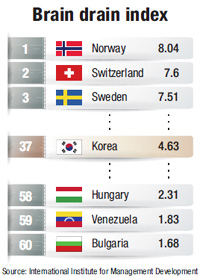- California Assembly OKs highest minimum wage in nation
- S. Korea unveils first graphic cigarette warnings
- US joins with South Korea, Japan in bid to deter North Korea
- LPGA golfer Chun In-gee finally back in action
- S. Korea won’t be top seed in final World Cup qualification round
- US men’s soccer misses 2nd straight Olympics
- US back on track in qualifying with 4-0 win over Guatemala
- High-intensity workout injuries spawn cottage industry
- CDC expands range of Zika mosquitoes into parts of Northeast
- Who knew? ‘The Walking Dead’ is helping families connect
S. Korea ranked low in Brain Drain Index
More and more highly educated scientists and engineers leave for another country
An increasing number of highly skilled science and engineering graduates with master’s and doctoral degrees are leaving Korea in droves, a report showed.
According to the International Institute for Management Development (IMD), Korea scored 4.63 on the Brain Drain Index (BDI) last year, ranking 37th out of 60 countries.
The index, on a scale of 0 to 10, indicates the intensity of the “brain drain” from each country, where the lower the reading the stronger the tendency for highly educated people to leave a country.
Korea’s BDI has been on a downward trend. It stood at 7.53 in 1995 but fell to 4.91 in 2006, 3.68 in 2011 and 3.40 in 2012. This mainly shows the outflow of masters or PH.D.s in science and engineering given the fact that only a few in social science and liberal arts find jobs overseas.
By comparison, Norway scored the highest index of 8.04, followed by Switzerland with 7.6, Sweden with 7.51, Finland with 7.28 and the U.S. with 7.11. Bulgaria scored the lowest mark of 1.68 with Venezuela, Hungary, Poland and Russia scoring 1.83, 2.31, 2.33 and 2.51, respectively.
The result came as a surprise given the nation’s high level of investment in research and development.
According to the Ministry of Science, ICT and Future Planning, the annual R&D spending stood at about $50 billion in 2012, the sixth-largest amount in the world, following the U.S. with $415 billion, Japan with $200 billion, China with $134 billion, Germany with $103 billion and France with $62 billion.
The portion of Korea’s R&D spending to the gross domestic product stood at 4.36 percent, which is the highest level after Israel with 4.38 percent. The portion stood at 3.78 percent in Finland, 3.39 percent in Japan, 3.37 percent in Sweden and 3.09 percent in Denmark.
Experts attributed Korea’s poor research environment as the main factor behind the brain drain problem. “The nation lacks policies to attract skilled science and engineering talents and also many researchers feel skeptical about Korea’s research environment,” said Jang Woo-seok, a research fellow at Hyundai Economic Research Institute.
Surveys of engineers also support Jang’s argument.According to a survey by the Korea Institute of S&T Evaluation and Planning, about 40 percent of 1,500 doctoral degree holders in science and engineering said they wanted to work overseas.Another survey in 2008 by the U.S.-based National Science Foundation also showed that about 54 percent of Koreans who obtained U.S. doctoral degrees said they did not want to return to their home country.
Another survey in 2008 by the U.S.-based National Science Foundation also showed that about 54 percent of Koreans who obtained U.S. doctoral degrees said they did not want to return to their home country.
It is also true that skilled science and engineering talents are interested in national programs of advanced countries which invest large amounts of time and money to attract talented people from overseas.
Countries such as the U.S., the U.K., Canada and Singapore, have a new system where talented engineers and doctorial degree holders in science can get work visas.













